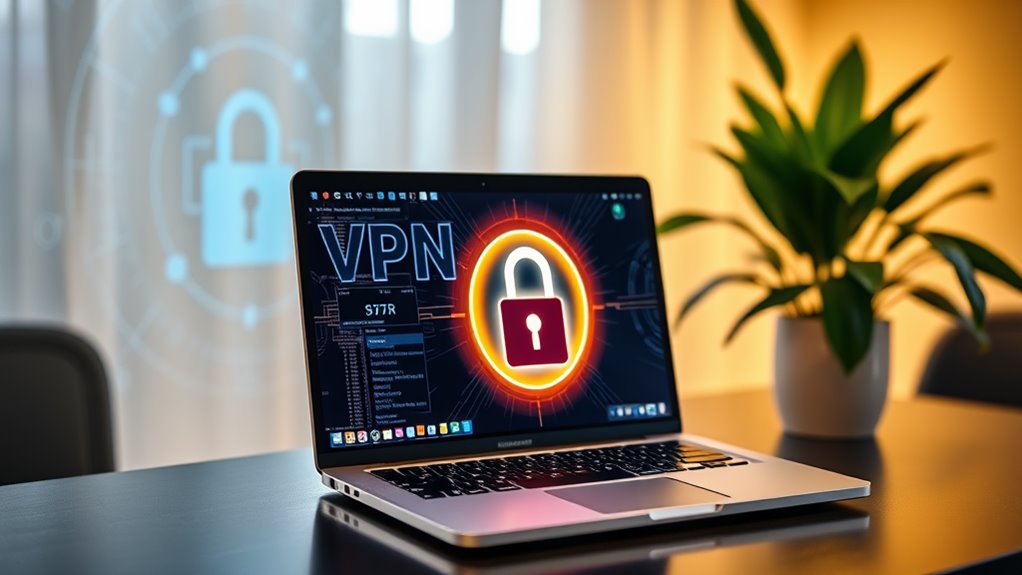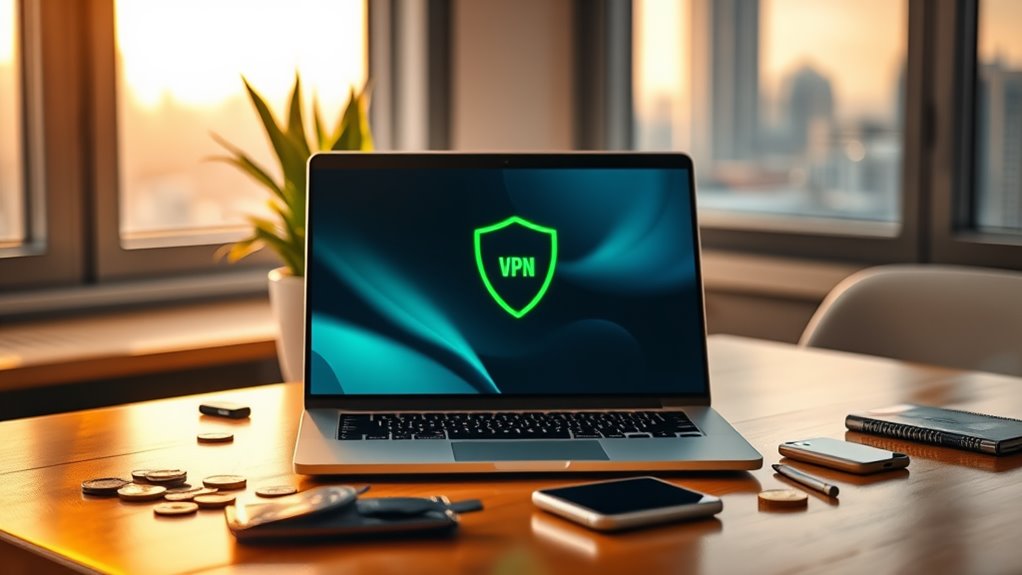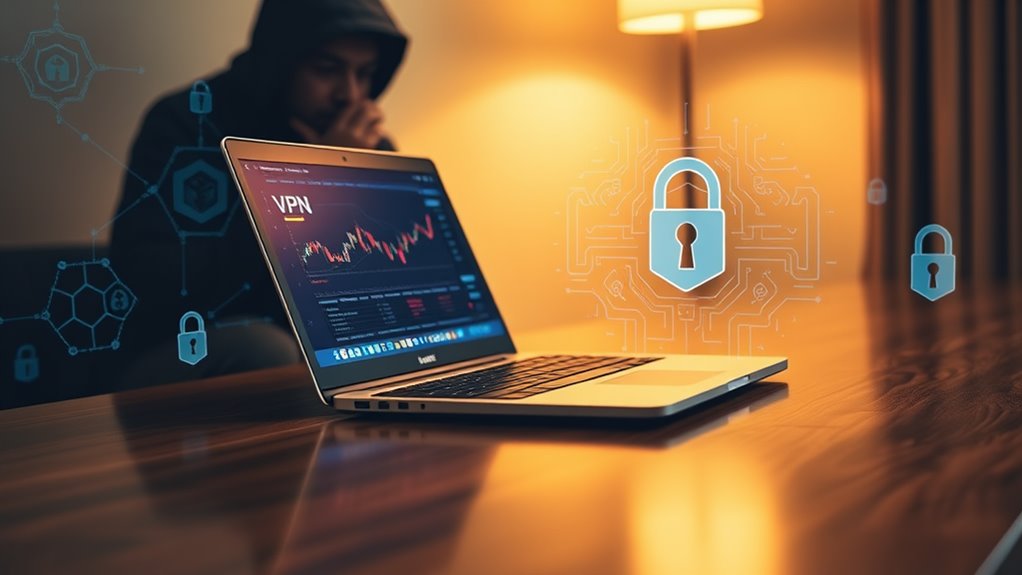
How to Use a VPN for Crypto Security: Protect Assets From Hackers
A VPN protects cryptocurrency assets by encrypting transactions and masking IP addresses. Users should select services with strong encryption, no-logs policies, and kill switches to prevent exposure during disconnections. Proper setup includes installing from official sources, enabling security features, and verifying protection with leak tests. When trading, enable two-factor authentication on both VPN and exchange accounts. Combining VPNs with hardware wallets creates a thorough security approach for both online and offline protection.
Key Takeaways
- Select a VPN with AES-256 encryption and a strict no-logs policy to prevent hackers from intercepting crypto transactions.
- Enable the kill switch feature to instantly disconnect internet if VPN fails, preserving anonymity during transactions.
- Verify VPN security with IP leak testing tools before accessing wallets or trading on exchanges.
- Use dedicated devices for crypto trading with VPN enabled to minimize malware risks.
- Combine VPN protection with hardware wallets and two-factor authentication for comprehensive crypto security.
Essential VPN Features for Maximum Cryptocurrency Protection

When traversing the complex world of cryptocurrency transactions, investors must prioritize security features that protect their digital assets from potential threats.
The most essential VPN feature is strong encryption protocols, with modern algorithms like AES-256 and ChaCha20 providing robust protection against interception.
A clear no-logs policy guarantees that browsing history and transaction details remain private, preventing both the VPN provider and third parties from accessing sensitive information.
Kill switch functionality acts as a safety net, automatically disconnecting internet access if the VPN connection drops unexpectedly. This prevents accidental exposure of real IP addresses during trading.
IP leak protection, particularly DNS leak prevention, safeguards against inadvertent identity revelation.
Finally, reliable customer support is vital for troubleshooting security issues quickly, especially when time-sensitive transactions are involved. Additionally, using a VPN alongside secure wallets can significantly enhance the protection of crypto assets from unauthorized access.
Setting Up a VPN for Secure Crypto Transactions

Establishing a proper VPN setup forms the foundation of cryptocurrency transaction security in today’s volatile digital landscape. Users should begin by installing reputable VPN client software from official sources, followed by configuring secure login credentials and enabling the kill switch feature to prevent accidental exposure during disconnections.
Secure VPN implementation creates the critical first line of defense for cryptocurrency traders navigating digital risks.
When preparing your VPN for cryptocurrency activities:
- Verify your security with IP leak testing tools like ipleak.net before conducting any transactions.
- Select servers geographically close to your preferred exchanges to minimize latency issues.
- Enable strong encryption protocols such as WireGuard or OpenVPN for maximum protection.
- Regularly update your VPN software to maintain protection against emerging threats.
After configuration, integrate the VPN with wallet software and exchange platforms while implementing additional security measures like two-factor authentication. Moreover, using a VPN can further bolster your security by keeping your internet connection encrypted, thereby protecting against identity theft and fraud.
Combating Common Crypto Security Threats With VPNS

Despite the robust security measures inherent in blockchain technology, cryptocurrency users face numerous threats that require additional layers of protection. VPNs provide essential security benefits by encrypting internet traffic and concealing IP addresses, making it harder for attackers to target users.
While VPNs cannot directly prevent phishing attacks, they secure browsing activities and protect against network manipulation. When interacting with potentially fake wallets or exchanges, VPNs guarantee secure data transmission and help maintain anonymity.
For those researching cryptocurrency investments, VPNs reduce visibility to potential scammers running pump and dump schemes. Additionally, by staying informed about common types of phishing, VPNs can help users avoid falling victim to these sophisticated scams.
Though not a complete solution for blockchain-specific threats like Sybil or eclipse attacks, VPNs add security by obscuring node identities. Additionally, the encryption offered helps mitigate malware and ransomware threats that target crypto users.
Best VPN Practices When Trading on Exchanges

Securing cryptocurrency transactions on exchanges requires implementing robust VPN strategies that go beyond basic connection protocols.
Traders should establish thorough security measures that integrate VPN functionality with exchange-specific protections.
Layered security protocols combining VPN safeguards with exchange-specific defenses create essential protection for serious cryptocurrency traders.
- Always enable the kill switch feature to prevent IP exposure during unexpected VPN disconnections.
- Use dedicated devices exclusively for trading, minimizing the risk of malware contamination.
- Enable two-factor authentication on both the VPN and exchange accounts for layered security.
- Regularly verify VPN connections for DNS leaks before accessing trading platforms.
When selecting servers, traders should prioritize locations that optimize connection speed while providing access to preferred exchanges.
Public Wi-Fi should be avoided entirely, but when necessary, VPN protection becomes non-negotiable.
Regular security audits of VPN configurations guarantee continued protection against evolving threats in the cryptocurrency landscape. Additionally, implementing multi-factor authentication is crucial for enhancing account security and protecting against unauthorized access.
Integrating VPNS With Hardware Wallets for Enhanced Security

The powerful combination of VPNs and hardware wallets creates a formidable security framework for cryptocurrency owners seeking thorough protection. When used together, these technologies establish multiple security layers that protect digital assets from various attack vectors. VPNs encrypt internet traffic and mask IP addresses, while hardware wallets keep private keys stored offline.
| Security Feature | VPN Contribution | Hardware Wallet Contribution |
|---|---|---|
| Data Protection | Encrypts internet traffic | Stores private keys offline |
| Privacy | Conceals IP address | Prevents unauthorized access |
| Transaction Security | Protects against surveillance | Signs transactions internally |
This integration addresses both online and offline security concerns. The VPN shields users from network-based attacks when connecting to exchanges or blockchain networks, while the hardware wallet guarantees private keys remain secure from malware and remote attacks, even if the computer is compromised. Moreover, employing trusted key management systems enhances the overall security posture by ensuring that private keys are not only stored securely but also managed effectively.
Frequently Asked Questions
Can VPNS Protect Against SIM Swapping Attacks in Crypto?
VPNs cannot directly protect against SIM swapping attacks as these occur at the telecom level. While VPNs encrypt internet traffic and mask IP addresses, they do not prevent unauthorized SIM card transfers or intercept SMS-based authentication codes.
Do VPNS Affect Blockchain Transaction Confirmation Times?
While many assume VPNs might delay blockchain transactions, they actually don’t impact confirmation times. These are determined by network congestion, transaction fees, and blockchain architecture—not the internet connection’s encryption or routing path.
Are Free VPNS Sufficient for Cryptocurrency Security?
Free VPNs are generally insufficient for cryptocurrency security due to data privacy concerns, weak encryption, security vulnerabilities, and potential logging practices. Paid VPN services with strong encryption and no-logs policies are strongly recommended instead.
Can Government Agencies Track Crypto Transactions Despite VPN Usage?
Like foxes tracking prey despite the mist, government agencies can indeed trace cryptocurrency transactions regardless of VPN usage. Blockchain analysis tools enable them to follow transaction patterns and collaborate with exchanges to overcome VPN’s IP-hiding capabilities.
How Do VPNS Interact With Crypto Tax Reporting Software?
VPNs operate independently from crypto tax reporting software. While VPNs encrypt internet connections and enhance security, they don’t interfere with how tax tools like Koinly track, calculate, and report cryptocurrency transactions for tax compliance purposes.
Conclusion
Implementing a VPN for cryptocurrency security represents an essential layer in protecting digital assets. As the saying goes, “an ounce of prevention is worth a pound of cure.” By following proper setup procedures, selecting VPNs with vital security features, and integrating them with hardware wallets, investors can greatly reduce their vulnerability to common threats. When combined with vigilant trading practices, VPNs help create a thorough security strategy for cryptocurrency management.














